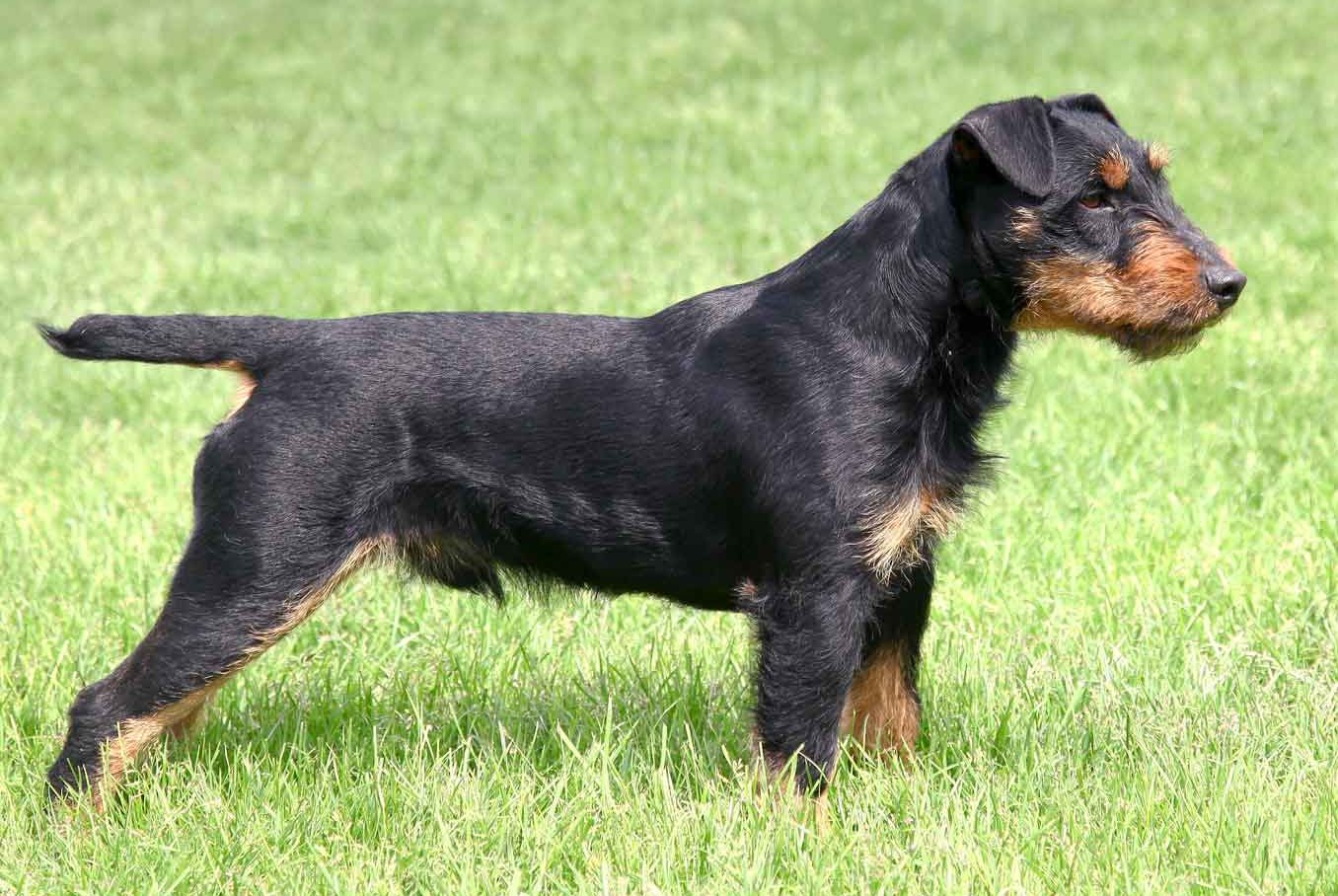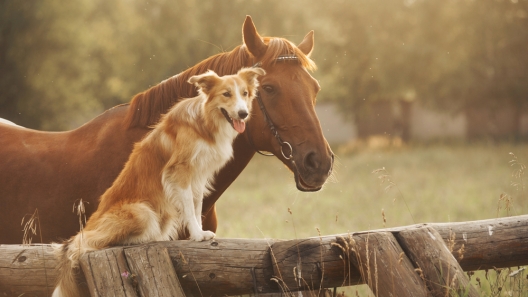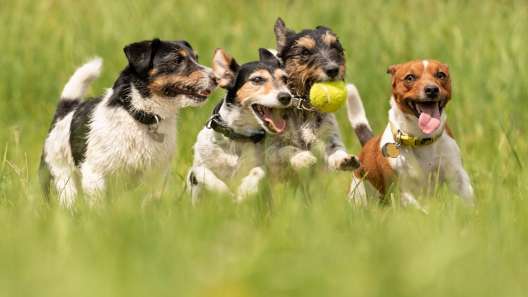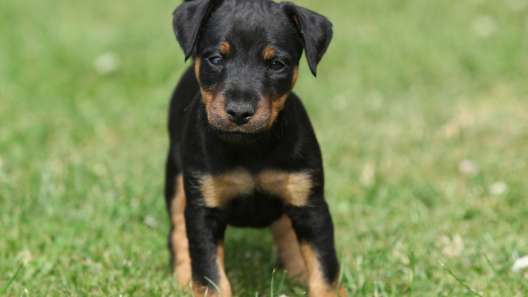-
Activity Level:
high
-
Shedding Level:
moderate
-
Grooming Level:
moderate
-
Trainability:
moderate
-
Good for Novice Owners:
moderate
-
Adaptability:
high
-
Kid/Pet Friendly:
often
-
Prey Drive:
high
-
Watchdog:
very alert
- Average Size: Small
- Average Lifespan: 10-12 years
- Registered?: aca, other
German Hunt Terrier Dog Breed Information
Overview
Temperament
Adaptability
Health
Owner Experience
Grooming
Activity Level
Size
Life Span
Did You Know?
The German Hunt Terrier originated in Germany after World War I. A small group of hunters that were part of the Fox-Terrier Club separated with the goal of creating a black and tan hunting dog. They wanted a hunting dog that could handle anything and excel at hunting underground.
After several crosses with original black and tan Fox Terriers with the Welsh Terrier and the Old English Wirehaired Terrier, the German Hunt Terrier was born. They were prized for their versatility, high trainability, happy disposition, and skill at working underground and flushing out prey.
The German Hunt Terrier Club was founded in 1926 and the American Kennel Club currently recognizes this dog breed as a member of their Foundation Stock Service. They are also recognized by the United Kennel Club, Australian National Kennel Club, and New Zealand Kennel Club.
German Hunt Terriers are highly intelligent dogs that are affectionate with their family. They tend to be sociable and very people friendly, which means they tend to get along well with children. They don’t tend to get along with other dogs easily unless they were raised and socialized together, but they still often prefer to be the only pet in the household.
These small dogs tend to be focused, determined, and fast when they are working. When they are with their families, they tend to be energetic, playful, and sweet. Because they are hunting dogs, they have a high prey drive and an urge to chase. So, they may not do well with other small pets in the household and will need extra socialization and training with them.
These dogs are highly adaptable. Because they are high-energy dogs, German Hunt Terriers are best suited to homes with yards where they can run. But, they can adapt to apartment living as long as they are given enough exercise, mental stimulation, and attention. Due to their hunting and chasing instincts, they should only be let off-leash in securely fenced areas.
They do well in most climates. As with any dog breed, they are sensitive to heat and extreme cold. Due to their small size, they may also need to bundle up when the temperatures drop to stay warm enough. Having the right mix of winter dog products on hand can be a big help. They bond closely with their families, so they don’t like to spend a lot of time alone.
This is a relatively healthy dog breed. As with any dog breed, there are some potential health concerns to be aware of. In the German Hunt Terrier, these potential health concerns include glaucoma, hypothyroidism, cataracts, hearing loss, deafness, Legg-Calve-Perthes disease, and primary lens luxation.
Responsible breeders will screen their stock to avoid passing diseases on to puppies. So, don’t be afraid to ask about the genetic and health history of both of the parents. These dogs also tend to have sensitive stomachs. As a small dog breed, they are also more prone to developing dental disease as well.
Although the German Hunt Terrier is highly intelligent and picks up on things quickly, they can have a stubborn streak. They also tend to get bored easily. These things can be a challenge for a first-time dog owner, so puppy training classes are recommended. Puppy training classes can be a good idea regardless of owner experience because they often offer opportunities to socialize a puppy.
German Hunt Terriers have a short smooth coat that sheds moderately year-round with heavier shedding sessions as the seasons change. Brushing a few times a week and the occasional bath when needed is enough to keep this dog’s coat healthy and looking great.
In addition to coat care, you will also need to take care of your German Hunt Terrier’s nails, ears, and teeth. Cutting your dog’s nails monthly is usually enough to keep them from growing too long, but you may need to trim them more often if your dog’s nails grow quickly or aren’t wearing down as much naturally.
Checking ears weekly and carefully cleaning your dog’s ears when needed can help prevent ear infections. You want to make sure your dog’s ears are dry, clean, free of debris, and free of pests. If you see irritation, redness, discolored discharge, or something else that is concerning, it’s time for a trip to the vet.
Due to a general lack of good dental care for dogs, gum disease is one of the most common health issues in dogs. But, it doesn’t have to be! Brushing your dog’s teeth or using an enzyme toothpaste every day is ideal for preventing the plaque and tartar buildup that leads to gum disease, tooth decay, and tooth loss later in life. Using vet-approved dental hygiene treats or a “dental care diet” formulated just for your dog can help supplement your efforts.
The German Hunt Terrier may be small, but they are high-energy dogs that were bred for speed and endurance. Daily walks plus playtime and extra activity are usually enough to keep this dog happy and healthy. They also need a job to do to be happy.
These dogs will also likely be up for more activity if you are, so don’t be afraid to try new things with your dog. They may enjoy a game of fetch or learning how to play frisbee. They may also enjoy taking a hike with you or learning a dog sport.
A fully-grown German Hunt Terrier usually stands 13-16 inches tall at the shoulder and weighs 17-22 pounds.
A German Hunt Terrier generally lives 10-12 years.
The German Hunt Terrier is also called a Jagdterrier, which means “hunt terrier” in German.









